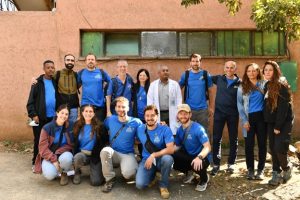
February 11, marks international day of women and girls in science by the UN women calling on everyone to smash stereotypes, defy gender biases and defeat discrimination that hold women and girls back in STEM fields.
According to a study by UN Women, currently, just 30 per cent of researchers worldwide are women, and only 35 per cent of all students enrolled in STEM related fields of study are women.
Despite these setbacks, women and girls continue to lead innovation and ground-breaking research. They have created life-saving medicine and broken the sound barrier, explored the universe and laid the foundation to understand the structure of DNA. They are inspiring role models for our future generations.
This year On International Day of Women and Girls in STEM Seven women scientists who have shaped our world was hailed for excelling in research and science field and contributing to bridging the gender gap.
Among them is found Dr Segenet Kelemu an Ethiopian scientist, noted for her research as a molecular plant pathologist, and outstanding scientific leadership. Segenet Kelemu and her team’s research has contributed to addressing agricultural constraints in Africa, Asia, Latin America and North America for close to three decades.
Dr Segenet was born in the Ethiopian town of Finote Selam in 1957. She was the first woman from her state to get a college degree.
Like many other children in her village, Dr Segenet was expected to help out with farming chores. Moreover, from an early age, she displayed a strong sense of responsibility, and as a result, her mother assigned her the task of selling farm produce in the market certain that she would negotiate the best prices and keep the money safe. Thus, Dr Segenet learnt the hard truths about agriculture and its back breaking labour especially for women, as well challenges to productivity, which placed people in her community in a constant struggle to meet minimum household food needs but amidst all, the sector’s potential. As a result, she felt a calling to seek solutions for agricultural constraints. Therefore, though an all-round top grade student, Dr Segenet decided to dedicate herself to science and agriculture studied agriculture when her parents really wanted her to be a medical doctor. Today, she has experienced the challenges and successes associated with agricultural research in developing and developed countries from a variety of perspectives.
There are also many factors that influenced Dr Segent’s life. Education was free in Ethiopia and her parents bought her the necessary stationery. Above all, her own determination and hard work helped her attain her goals.
On a recent interview she gave to Africa women and child feature service, Dr Segenet recalls that most young girls were married off but she was lucky because her parents could not find a suitor. “I was in the unmarriageable or undesirable category. I was too rebellious and defiant for any parent to want me as their daughter-in-law. I could easily imagine that this was perhaps distressful to my parents at the time, but I knew all along that I was lucky. I now understand that some of my behaviour earned me a ticket to freedom,’’ says Dr Segenet
She has defied many odds to become a leading scientist in Africa. She notes that there are many people who have contributed to her education and professional journey and that she has lived to their expectations and become outstanding in her studies. “In my village, girls were married off at a very young age, but luckily I was too rebellious for anyone to arrange a marriage for me, I was really determined to go to university,” she said.
“The best I can do is to be the best I can through hardwork and to try to change a few ignorant minds around me that still perceive women as failures and those that cannot fathom black people as successful scientists, effective managers, directors or anything else if given the opportunity,” she noted.
Dr Segenet is now more than two decades old in team leadership, management and research experience which have spanned academia, national agricultural systems and two CGIAR institutes. This includes leading the Crop and Agro-ecosystem Health Management Program at the International Centre for Tropical Agriculture (CIAT), and serving as director of the Biosciences eastern and central Africa (BecA) Hub at the International Livestock research Institute (ILRI).
She was awarded a L’Oréal-UNESCO Award for Women in Science in 2014, named one of the 100 most influential African women by Forbes Africa, and elected as a Fellow of The World Academy of Sciences in 2015 among other many achievements.
After years of studying and working abroad, Dr Segenet returned to Africa to lead a new generation of scientists. “I think investment in African agriculture, investment in African research is actually investment for mankind as a whole,” she says.
“I navigated both of these roles through times of uncertainty and complex transitions, helping these institutions to flourish and gain international acclaim in the agricultural development and scientific communities,’’ she says
The agriculturalist woman of many firsts and a hero in her field, Dr Segenet inspires all women to work with purpose and dedication for the causes they care about. The drive of my life is to make a difference in people’s lives and to improve agriculture in Africa,” she shares.
THE ETHIOPIAN HERALD SUNDAY EDITIONFEBRUARY 16 / 2020
BY FASICA BERHANE





